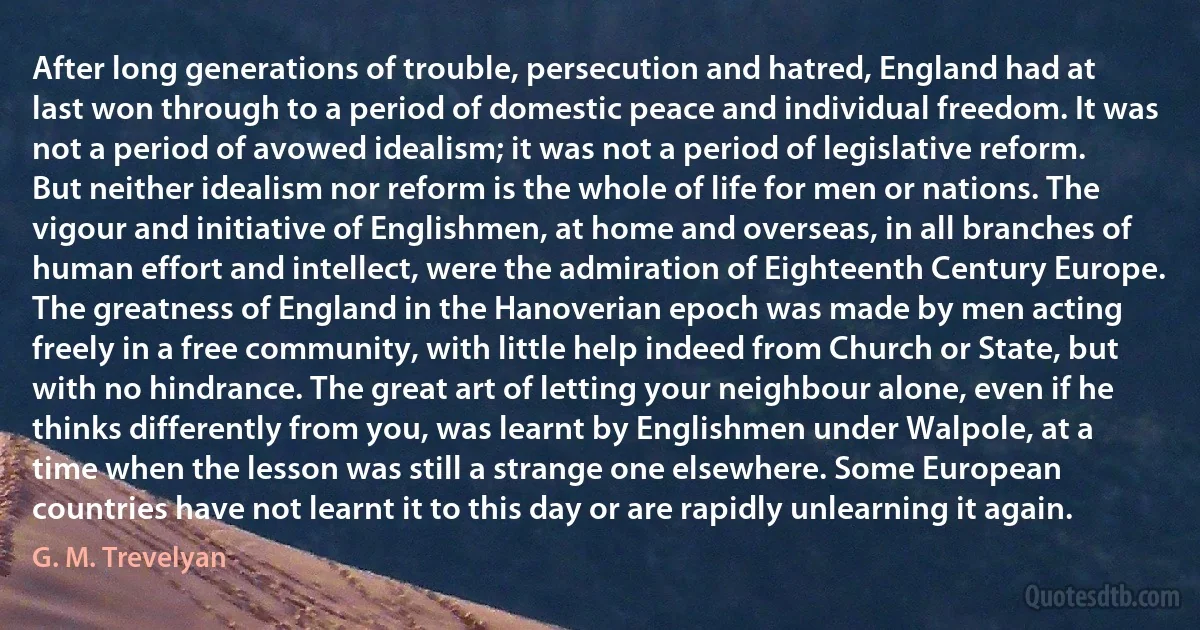
After long generations of trouble, persecution and hatred, England had at last won through to a period of domestic peace and individual freedom. It was not a period of avowed idealism; it was not a period of legislative reform. But neither idealism nor reform is the whole of life for men or nations. The vigour and initiative of Englishmen, at home and overseas, in all branches of human effort and intellect, were the admiration of Eighteenth Century Europe. The greatness of England in the Hanoverian epoch was made by men acting freely in a free community, with little help indeed from Church or State, but with no hindrance. The great art of letting your neighbour alone, even if he thinks differently from you, was learnt by Englishmen under Walpole, at a time when the lesson was still a strange one elsewhere. Some European countries have not learnt it to this day or are rapidly unlearning it again.
G. M. TrevelyanRelated topics
art century church day effort eighteenth elsewhere epoch free freedom great greatness hatred help hindrance home human idealism initiative men last learn legislative life nor peace persecution state strange time trouble under won neighbour vigour unlearningRelated quotes
They show as little Reason as Conscience who put the matter by with saying-"Men, in some cases, are lawfully made Slaves, and why may not these?" So men, in some cases, are lawfully put to death, deprived of their goods, without their consent; may any man, therefore, be treated so, without any conviction of desert? Nor is this plea mended by adding-"They are set forth to us as slaves, and we buy them without farther inquiry, let the sellers see to it." Such men may as well join with a known band of robbers, buy their ill-got goods, and help on the trade; ignorance is no more pleadable in one case than the other; the sellers plainly own how they obtain them. But none can lawfully buy without evidence that they are not concurring with Men-Stealers; and as the true owner has a right to reclaim his goods that were stolen, and sold; so the slave, who is proper owner of his freedom, has a right to reclaim it, however often sold.

Thomas Paine
Violence as a way of achieving racial justice is both impractical and immoral. I am not unmindful of the fact that violence often brings about momentary results. Nations have frequently won their independence in battle. But in spite of temporary victories, violence never brings permanent peace. It solves no social problem: it merely creates new and more complicated ones. Violence is impractical because it is a descending spiral ending in destruction for all. It is immoral because it seeks to humiliate the opponent rather than win his understanding: it seeks to annihilate rather than convert. Violence is immoral because it thrives on hatred rather than love. It destroys community and makes brotherhood impossible. It leaves society in monologue rather than dialogue. Violence ends up defeating itself. It creates bitterness in the survivors and brutality in the destroyers.

Martin Luther King Jr.
If we observe the aging of individuals, in the period after middle life, it seems to me that we can distinguish three ideal-typical outcomes. Some individuals bear within themselves some psychological sources of self-renewal; aging brings for them accretions of wisdom, with no loss of spontaneity and ability to enjoy life, and they are relatively independent of the culture's strictures and penalties imposed on the aged. Other individuals, possibly the majority, bear within them no such resources but are the beneficiaries of a cultural preservative (derived from work, power, position, etc.) which sustains them although only so long as the cultural conditions remain stable and protective. A third group, protected neither from within nor from without, simply decay. In terms more fully delineated elsewhere, we may have autonomous, adjusted, and anomic reactions to aging.

David Riesman
The proof of the pudding is in the eating. There was a widespread myth of the 1970s, a myth along Tom Kuhn's (1962) Structure of Scientific Revolutions lines. The Keynesianism, which worked so well in Camelot and brought forth a long epoch of price-level stability with good Q growth and nearly full employment, gave way to a new and quite different macro view after 1966. A new paradigm, monistic monetarism, so the tale narrates, gave a better fit. And therefore King Keynes lost self esteem and public esteem. The King is dead. Long live King Milton!
Contemplate the true facts. Examine 10 prominent best forecasting models 1950 to 1980: Wharton, Townsend–Greenspan, Michigan Model, St. Louis Reserve Bank, Citibank Economic Department under Walter Wriston's choice of Lief Olson, et cetera. ... M did matter as for almost everyone. But never did M alone matter systemically, as post-1950 Friedman monetarism professed.

Paul Samuelson
Kevin Kruse in his book One Nation Under God: How Corporate America Invented Christian America details how industrialists in the 1930s and 1940s poured money and resources into an effort to silence the social witness of the mainstream church, which was home to many radicals, socialists and proponents of the New Deal. These corporatists promoted and funded a brand of Christianity-which is today dominant-that conflates faith with free enterprise and American exceptionalism. The rich are rich, this creed goes, not because they are greedy or privileged, not because they use their power to their own advantage, not because they oppress the poor and the vulnerable, but because they are blessed. And if we have enough faith, this heretical form of Christianity claims, God will bless the rest of us too. It is an inversion of the central message of the Gospel. You don't need to spend three years at Harvard Divinity School as I did to figure that out.

Chris Hedges
